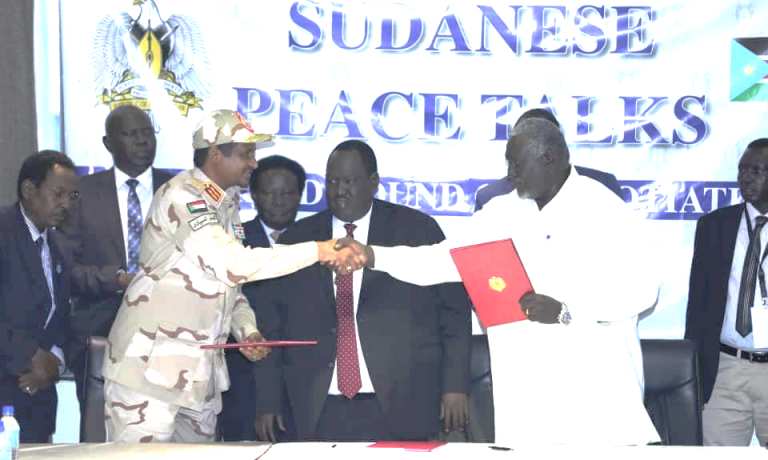Sudan, SPLM-N Agar strike humanitarian and ceasefire agreement

December 19, 2019 (KHARTOUM/JUBA) – Sudanese transitional government and the SPLM-N led by Malik Agar Tuesday signed a framework agreement to cease hostilities and deliver humanitarian aid to the war-affected areas in the Blue Nile and South Kordofan states.
The agreement was signed by Mohamed Hamdan Daglo, the head of the government negotiating delegation and Malik Agar SPLM-N Agar leader as well as Presidential Adviser on Security Affairs Tut Kew Gatluak for the South Sudanese mediation.
The signing ceremony was attended by several members of the Sovereign Council, Forces for Freedom and Change (FFC) and Sudanese Revolutionary Front beside, representatives from the African Union, IGAd and the host country South Sudan.
The agreement says that humanitarian action is carried out in the Two Areas under international law, principles of humanitarian action, impartiality, neutrality and independence.
“The delivery and distribution of humanitarian aid and relief will be facilitated through internal and external corridors, as needed,” provides the text of the deal seen by Sudan Tribune.
Before the launch of the humanitarian operation, a joint committee will be formed to assess humanitarian needs, open crossing points and define corridors to deliver the humanitarian assistance to the civilians affected by war.
The humanitarian issue was a major obstacle in the negotiations on peace between the Bashir government and the SPLM-N during the past years.
The Movement called for external corridors to ensure the delivery of humanitarian aid and to send the injured fighters to be treated abroad, but Khartoum rejected this demand at the time.
For the cessation of hostilities, the parties agreed to form mechanisms to monitor the implementation of the cessation of hostilities in the areas controlled by the SPLM-N Agar in the Two Areas.
Within a week from the date of the signing, the parties will set a timetable for the implementation of the agreement. Also, committees will be formed in Khartoum and Kadugli to ensure its implementation.
They also indicated that this deal will be developed to a permanent ceasefire after signing the peace agreement.
“This agreement ended the arrogance and immorality that the National Congress practised in humanitarian and war issues,” said Yasir Arman the SPLM-N deputy leader n statement to Sudan Tribune.
He added that this agreement should have been completed eight years ago, but the former regime refused to allow the delivery of humanitarian aid to the Two Areas and refused to agree on the humanitarian corridors, “which is a war crime”.
Meanwhile, the South Sudanese mediation announced the resumption of direct negotiations between the government and armed movements, on Wednesday.
The mediation said that the direct negotiations had been suspended on Monday for one day.
The SPLM-N al-Hilu issued a statement on Monday saying they are far from reaching a declaration of principles with the transitional government. The statement stressed the need to include the right of self-determination in the talks unless the government accepts that the future constitution will provide that Sudan is a secular state.
The Juba process includes five tracks for Darfur, South Kordofan and Blue Nile states, eastern Sudan, northern Sudan track, and the central Sudan track.
Due to the Christmas and end of the year holidays, the parties will suspend the talks this week to resume discussions in January.
Initially, the government and the SRF agreed to end the peace process before 14 December but last week they extended the negotiations until 14 February 2020, days before the end of the deadline fixed by the constitutional declaration.
Reaching negotiated settlement for the conflicts across the country within six months tops the agenda of the transitional period which has been started on 21 August.
(ST)
